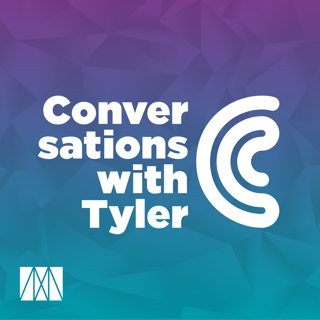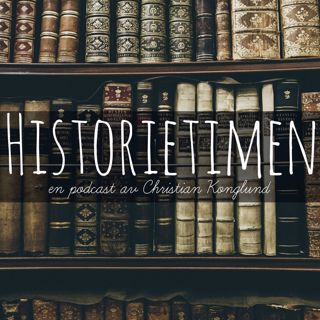
Pierpaolo Barbieri on Latin American FinTech
Gifted young Argentines tend to leave home to "make it in America" and never look back, but after earning a degree from Harvard, writing a book about the Spanish Civil War, and living in the United States for 12 years, Pierpaolo Barbieri has returned to Argentina. And he's bringing foreign capital and talented expats with him. Pierpaolo's FinTech startup Ualá works to bring universal banking to a Latin American market in which huge swaths of the population are still stuck using cash for everything. By giving the working classes power over their own money, he hopes to produce greater prosperity and social mobility in his home country and beyond. Pierpaolo joined Tyler to discuss why the Mexican banking system only serves 30 percent of Mexicans, which country will be the first to go cashless, the implications of a digital yuan, whether Miami will overtake São Paolo as the tech center of Latin America, how he hopes to make Ualá the Facebook of FinTech, Argentina's bipolar fiscal policy, his transition from historian to startup founder, the novels of Michel Houellebecq, Nazi economic policy, why you can find amazing and cheap pasta in Argentina, why Jorge Luis Borges might be his favorite philosopher, the advice he'd give to his 18-year-old self, his friendship with Niall Ferguson, the political legacy of the Spanish Civil War, why he stopped sending emails from bed, and more. Read a full transcript enhanced with helpful links, or watch the full video. Recorded April 12th, 2021 Other ways to connect Follow us on Twitter and Instagram Follow Tyler on Twitter Follow Pierpaolo on Twitter Email us: cowenconvos@mercatus.gmu.edu Subscribe at our newsletter page to have the latest Conversations with Tyler news sent straight to your inbox.
19 Mai 202156min

Daniel Carpenter on Smart Regulation
Daniel Carpenter is one of the world's leading experts on regulation and the foremost expert on the US Food and Drug Administration. A professor of Government at Harvard University, he's conducted extensive research on regulation and government organizations, as well as on the development of political institutions in the United States. His latest book Democracy by Petition: Popular Politics in Transformation, details the crucial role petitions played in expanding the franchise and shaping modern America. Daniel joined Tyler to discuss how to reform the hiring and firing practices for public employees, what the history of the postal service can teach us about internet regulation, the problem with the term "institutional capture", what the FDA got right and wrong regarding COVID-19 vaccines, how nationalism is affecting vaccine rollout, why vaccinating the young is crucial for herd immunity, the drawbacks of a "Good Housekeeping" model of the FDA, how black box drug labels sometimes change behavior for the worse, the institutional variables of foreign drug trials and manufacturing, the pivotal role petitions played during the 19th century women's rights movement, the French Canadian petition that changed history, why political scientists should study Native Americans, the benefits of fly fishing, and more. Read a full transcript enhanced with helpful links, or watch the full video. Recorded April 1st, 2021 Other ways to connect Follow us on Twitter and Instagram Follow Tyler on Twitter Email us: cowenconvos@mercatus.gmu.edu Subscribe at our newsletter page to have the latest Conversations with Tyler news sent straight to your inbox.
5 Mai 20211h 8min

Shadi Bartsch on the Classics and China
A self-professed nerd, the young Shadi Bartsch could be found awake late at night, reading Latin under the covers of her bed by flashlight. Now a professor of Classics at the University of Chicago, Dr. Bartsch is one of the best-known classicists in America and recently published her own translation of Virgil's Aeneid. Widely regarded for her writing on Seneca, Lucan, and Persius, her next book focuses on Chinese interpretations of classic literature and their influence on political thought in China. Shadi joined Tyler to discuss reading the classics as someone who is half-Persian, the difference between Homer and Virgil's underworlds, the reasons so many women are redefining Virgil's Aeneid, the best way to learn Latin, why you must be in a room with a native speaker to learn Mandarin, the question of Seneca's hypocrisy, what it means to "wave the wand of Hermes", why Lucan begins his epic The Civil War with "fake news", the line from Henry Purcell's aria that moves her to tears, her biggest takeaway from being the daughter of an accomplished UN economist, the ancient text she's most hopeful that new technology will help us discover, the appeal of Strauss to some contemporary Chinese intellectuals, the reasons some consider the history of Athens a better allegory for America than that of Rome, the Thucydides Trap, the magical "presentness" of ancient history she's found in Italy and Jerusalem, her forthcoming book Plato Goes to China, and more. Read a full transcript enhanced with helpful links, or watch the full video. Recorded March 16th, 2022 Other ways to connect Follow us on Twitter and Instagram Follow Tyler on Twitter Follow Shadi on Twitter Email us: cowenconvos@mercatus.gmu.edu Subscribe at our newsletter page to have the latest Conversations with Tyler news sent straight to your inbox.
21 Apr 20211h

Dana Gioia on Becoming an Information Billionaire
Before he was California Poet Laureate or leading the National Endowment for the Arts, Dana Gioia marketed Jell-O. Possessing both a Stanford MBA and a Harvard MA, he combined his creativity and facility with numbers to climb the corporate ladder at General Foods to the second highest rung before abruptly quitting to become a poet and writer. That unique professional experience and a lifelong "hunger for beauty" have made him into what Tyler calls an "information billionaire," or someone who can answer all of Tyler's questions. In his new memoir, Dana describes the six people who sent him on this unlikely journey. In this conversation, Dana and Tyler discuss his latest book and more, including how he transformed several businesses as a corporate executive, why going to business school made him a better poet, the only two obscene topics left in American poetry, why narrative is necessary for coping with life's hardships, how Virgil influenced Catholic traditions, what Augustus understood about the cultural power of art, the reasons most libretti are so bad, the optimism of the Beach Boys, the best art museum you've never heard of, the Jungianism of Star Trek, his favorite Tolstoy work, depictions of Catholicism in American pop culture, what he finds fascinating about Houellebecq, why we stopped building cathedrals, how he was able to effectively lead the National Endowment for the Arts, the aesthetic differences between him and his brother Ted, his advice for young people who want to cultivate their minds, and what he wants to learn next. Read a full transcript enhanced with helpful links, or watch the full video. Recorded February 18th, 2021 Other ways to connect Follow us on Twitter and Instagram Follow Tyler on Twitter Follow Dana on Twitter Email us: cowenconvos@mercatus.gmu.edu Subscribe at our newsletter page to have the latest Conversations with Tyler news sent straight to your inbox.
7 Apr 20211h 18min

Sarah Parcak on Archaeology from Space
What can new technology tell us about our ancient past? Archaeologist and remote sensing expert Sarah Parcak has used satellite imagery to discover over a dozen potential pyramids and thousands of tombs from ancient Egypt. A professor of anthropology and founding director of the Laboratory for Global Observation at the University of Alabama at Birmingham, Sarah's work combines technology, historical study, and cultural anthropology to advance discoveries about the past while navigating the political and ethical dilemmas that plague excavation work today. She joined Tyler to discuss what caused the Bronze Age Collapse, how well we understand the level of ancient technologies, what archaeologists may learn from the discovery of more than a hundred coffins at the site of Saqqara, how far the Vikings really traveled, why conservation should be as much of a priority as excavation, the economics of looting networks, the inherently political nature of archaeology, Indiana Jones versus The Dig, her favorite contemporary bluegrass artists, the best archaeological sites to visit around the world, the merits of tools like Google Earth and Lidar, the long list of skills needed to be a modern archaeologist, which countries produce the best amateur space archaeologists, and more. Read a full transcript enhanced with helpful links, or watch the full video. Recorded February 25th, 2021 Other ways to connect Follow us on Twitter and Instagram Follow Tyler on Twitter Follow Sarah on Twitter Email us: cowenconvos@mercatus.gmu.edu Subscribe at our newsletter page to have the latest Conversations with Tyler news sent straight to your inbox.
24 Mar 20211h 4min

John Cochrane on Economic Puzzles and Habits of Mind
What unites John Cochrane the finance economist and "grumpy" policy blogger with John Cochrane the accomplished glider pilot? For John, the answer is that each derives from the same habit of mind which seeks to reduce things down to a few fundamental principles and a simple logical structure. And thus, piloting a glider can be understood as an application of optimal portfolio theory, and all of monetary policy can be made to fit within the structure of a single equation. John joined Tyler to apply that habit of mind to a number of puzzles, including why real interest rates don't equalize across countries, what explains why high trading volumes and active management persist in finance, how the pandemic has affected his opinion of habit formation theories, his fiscal theory of price level and inflation, the danger of a US sovereign debt crisis, why he thinks Bitcoin will eventually die, his idea for health-status insurance, becoming a national gliding champion, how a Renaissance historian for a father and a book translator for a mother shaped him intellectually, what's causing the leftward drift in economics, the need to increase competition among universities, how he became libertarian, the benefits of blogging, and more. Read a full transcript enhanced with helpful links, or watch the full video. Recorded January 4th, 2021 Other ways to connect Follow us on Twitter and Instagram Follow Tyler on Twitter Follow John on Twitter Email us: cowenconvos@mercatus.gmu.edu Subscribe at our newsletter page to have the latest Conversations with Tyler news sent straight to your inbox.
10 Mar 202158min

Patricia Fara on Newton, Scientific Progress, and the Benefits of Unhistoric Acts
Patricia Fara is a historian of science at Cambridge University and well-known for her writings on women in science. Her forthcoming book, Life After Gravity: Isaac Newton's London Career, details the life of the titan of the so-called Scientific Revolution after his famous (though perhaps mythological) discovery under the apple tree. Her work emphasizes science as a long, continuous process composed of incremental contributions–in which women throughout history have taken a crucial part–rather than the sole province of a few monolithic innovators. Patricia joined Tyler to discuss why Newton left Cambridge to run The Royal Mint, why he was so productive during the Great Plague, why the "Scientific Revolution" should instead be understood as a gradual process, what the Antikythera device tells us about science in the ancient world, the influence of Erasmus Darwin on his grandson, why more people should know Dorothy Hodgkin, how George Eliot inspired her to commit unhistoric acts, why she opposes any kind of sex-segregated schooling, her early experience in a startup, what modern students of science can learn from studying Renaissance art, the reasons she considers Madame Lavoisier to be the greatest female science illustrator, the unusual work habit brought to her attention by house guests, the book of caricatures she'd like to write next, and more. Read a full transcript enhanced with helpful links, or watch the full video. Recorded January 15th, 2021 Other ways to connect Follow us on Twitter and Instagram Follow Tyler on Twitter Email us: cowenconvos@mercatus.gmu.edu Subscribe at our newsletter page to have the latest Conversations with Tyler news sent straight to your inbox.
24 Feb 202157min

Brian Armstrong on the Crypto Economy
Brian Armstrong first recognized the potential of cryptocurrencies after witnessing firsthand the tragic consequences of hyperinflation in Argentina. Coinbase, the company he co-founded, aims to provide the primary financial accounts for the crypto economy. Their success in accomplishing this, he says, is due as much to their innovative approach to regulation as it is anything technological. Brian joined Tyler to discuss how he prevents Coinbase from being run by its lawyers, the value of having a mission statement, what a world with many more crypto billionaires would look like, why the volatility of cryptocurrencies like Bitcoin is more feature than bug, the potential for scalability in Ethereum 2.0, his best guess on the real identity of Satoshi, the biggest obstacle facing new charter cities, the meta rules he'd institute for new Martian colony, the importance of bridging the gap between academics and entrepreneurs, the future of crypto regulation, the benefits of stablecoin for the unbanked, his strongest and weakest interpersonal skill, what he hopes to learn from composing electronic music, and more. Read a full transcript enhanced with helpful links, or watch the full video. Recorded January 14th, 2022 Other ways to connect Follow us on Twitter and Instagram Follow Tyler on Twitter Follow Brian on Twitter Email us: cowenconvos@mercatus.gmu.edu Subscribe at our newsletter page to have the latest Conversations with Tyler news sent straight to your inbox.
10 Feb 202154min






















